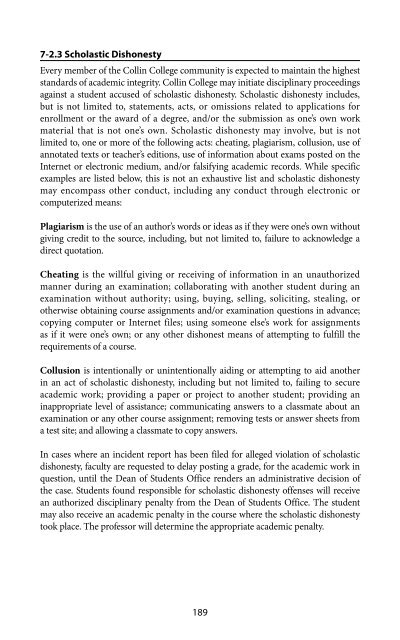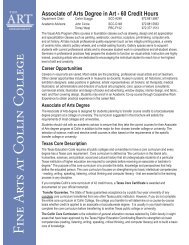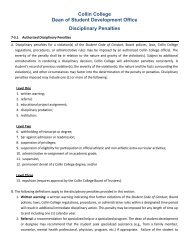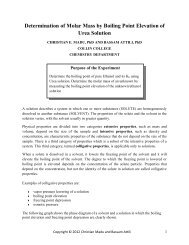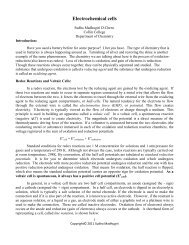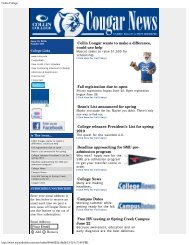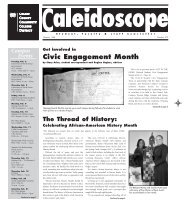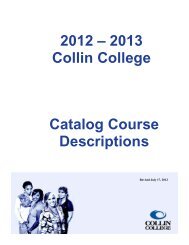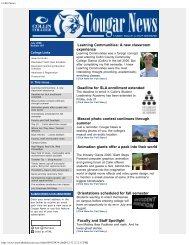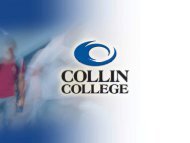2010-2011 Student Handbook - Collin College
2010-2011 Student Handbook - Collin College
2010-2011 Student Handbook - Collin College
You also want an ePaper? Increase the reach of your titles
YUMPU automatically turns print PDFs into web optimized ePapers that Google loves.
7-2.3 Scholastic Dishonesty<br />
Every member of the <strong>Collin</strong> <strong>College</strong> community is expected to maintain the highest<br />
standards of academic integrity. <strong>Collin</strong> <strong>College</strong> may initiate disciplinary proceedings<br />
against a student accused of scholastic dishonesty. Scholastic dishonesty includes,<br />
but is not limited to, statements, acts, or omissions related to applications for<br />
enrollment or the award of a degree, and/or the submission as one’s own work<br />
material that is not one’s own. Scholastic dishonesty may involve, but is not<br />
limited to, one or more of the following acts: cheating, plagiarism, collusion, use of<br />
annotated texts or teacher’s editions, use of information about exams posted on the<br />
Internet or electronic medium, and/or falsifying academic records. While specific<br />
examples are listed below, this is not an exhaustive list and scholastic dishonesty<br />
may encompass other conduct, including any conduct through electronic or<br />
computerized means:<br />
Plagiarism is the use of an author’s words or ideas as if they were one’s own without<br />
giving credit to the source, including, but not limited to, failure to acknowledge a<br />
direct quotation.<br />
Cheating is the willful giving or receiving of information in an unauthorized<br />
manner during an examination; collaborating with another student during an<br />
examination without authority; using, buying, selling, soliciting, stealing, or<br />
otherwise obtaining course assignments and/or examination questions in advance;<br />
copying computer or Internet files; using someone else’s work for assignments<br />
as if it were one’s own; or any other dishonest means of attempting to fulfill the<br />
requirements of a course.<br />
Collusion is intentionally or unintentionally aiding or attempting to aid another<br />
in an act of scholastic dishonesty, including but not limited to, failing to secure<br />
academic work; providing a paper or project to another student; providing an<br />
inappropriate level of assistance; communicating answers to a classmate about an<br />
examination or any other course assignment; removing tests or answer sheets from<br />
a test site; and allowing a classmate to copy answers.<br />
In cases where an incident report has been filed for alleged violation of scholastic<br />
dishonesty, faculty are requested to delay posting a grade, for the academic work in<br />
question, until the Dean of <strong>Student</strong>s Office renders an administrative decision of<br />
the case. <strong>Student</strong>s found responsible for scholastic dishonesty offenses will receive<br />
an authorized disciplinary penalty from the Dean of <strong>Student</strong>s Office. The student<br />
may also receive an academic penalty in the course where the scholastic dishonesty<br />
took place. The professor will determine the appropriate academic penalty.<br />
189


